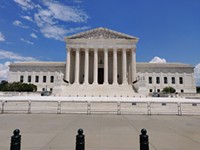SBOE: No Scholars Need Apply
SBOE members nominated several unqualified panelists to a social studies textbook review committee.
By Mary Tuma, Fri., July 25, 2014

The State Board of Education, nationally lampooned for continually dragging the Lone Star State into the culture wars, is at it again. According to a recent analysis by education watchdog the Texas Freedom Network, instead of degreed historians and other academic scholars, SBOE members nominated several unqualified panelists to a social studies textbook review committee. The committee recommends books to the board, which then votes to provide a small group of book options for local school districts.
"This is just the latest example of how a flawed process opens the door to ideologues who can have enormous influence on textbook adoptions and, ultimately, what students learn in our public schools," said TFN President Kathy Miller in a statement. "It's especially stunning that so few faculty members at our state's institutions of higher education got appointments to the review panels."
The dearth of scholars and experts on review committees is a time-honored SBOE tradition – for instance, in 2013, the board stacked a biology textbook review group with evolution deniers, intelligent design proponents, and religious activists. To rectify that persistent problem – in theory – the board passed tighter rules earlier this year, giving priority to experts volunteering to serve on the textbook review committees. However, considering the few well-qualified scholars appointed to the social studies panel, the SBOE is following its new rule mostly by omission.
While many on the social studies panel are at least legitimate teachers or educators (a promising sign), of more than 140 people selected to the panels overseeing geography, history, and economics, only three are faculty members at Texas colleges or universities; a "shockingly" low figure, says TFN. In fact, the group discovered the SBOE failed to accept applications from more than a dozen Texas academics, including faculty who had applied from UT-Austin, Huston-Tillotson University, as well as the chair of the history department at Southern Methodist University.
"To bypass those of us who are are specialists in these fields and have devoted our lives to education is really unfortunate," Hina Azam, assistant professor of Middle Eastern studies at UT-Austin, tells the Chronicle. Azam, who holds a master's degree in religion and a doctorate in Islamic studies from Duke University, is one of those academics who hoped to contribute her time to overseeing the textbook adoption process as a public service, but said she never received the green light. "I'm not sure who they're going to for information about the Muslim world, culture, and religion but it's likely someone with less education."
District 10 board member Tom Maynard, R-Georgetown, who represents part of Travis County, says it's important to include both non-scholars and academic experts: "In general, when we take a look at [the panels] we try to find a balance between folks that have expertise in an area and classroom teachers," he said, "because you have to have folks involved in how it plays out in the classroom."
That argument would be easier to swallow had the board not opted for "experts" like Mark Keough, a GOP candidate for House District 15 (The Woodlands), pastor, and former car salesman. Appointed by District 8 rep and board Chair Barbara Cargill, R-The Woodlands, Keough told the Montgomery County Tea Party he "doesn't believe the separation of church and state is part of the Constitution," as TFN notes. (Keough echoes board member David Bradley, who once offered $1,000 to anyone who could find the separation of church and state in the Constitution.)
"You have to wonder if Ms. Cargill identified the nomination as an in-kind donation to his campaign since she's giving him this free platform to promote his own political beliefs as he runs for office," said TFN's Dan Quinn.
For quality control, TFN is making sure experts review the textbooks. Sponsoring its own review panel independent of the Texas Education Agency, TFN hired scholars from a variety of universities, including UT, SMU, and the University of Mary Washington; the TFN committee plans to release their findings by September. Early analysis indicates serious problems – publishers appear to have struggled to write the textbooks to conform with the standards set by the SBOE while also teaching factual history, says Quinn. That's because the curriculum standard guidelines that publishers must adhere to, drafted amid controversy by the SBOE in 2009-10, are poorly constructed, biased, and factually inaccurate.
The 11th-hour revisions to U.S. history were so extreme, they drew censure from conservative think tank the Thomas B. Fordham Institute, which slapped the board with a "D" grade and deemed the standards "unteachable hodgepodge" and a "politicized distortion of history." Some lowlights: a vindication of McCarthyism; downplaying slavery's role as a cause of the Civil War; exaggerating biblical and religious influences on America's founding; the emphases on conservative leaders and movements (like the "Moral Majority"); and only a passing reference to segregation.
In hoping to sell their books to the huge Texas public school market, publishers find themselves stuck between an ideological rock and a hard place. "That is the core problem we face – we have highly politicized curriculum standards in place for our public schools and publishers have to meet those standards when they write their textbooks," said Quinn. "So those political biases are almost certainly going to be seen in the textbooks if publishers want to get board [approval]."
The SBOE panel met in Austin earlier this month to review the social studies books, and the board will hold public hearings on the textbooks in September and November, with a final vote scheduled for November. The books, to be adopted in the fall of 2015, would be used in Texas classrooms for the next decade.
Got something to say on the subject? Send a letter to the editor.








